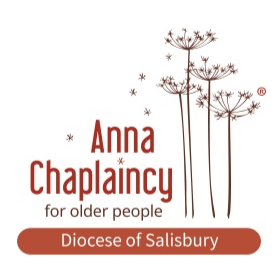
Anna Chaplaincy is named after the widow, Anna, who appears with Simeon in Luke’s gospel; both are good role models of faithful older people. It is an ecumenical, accompanying, person-centred ministry of spiritual care for older people of all faiths, cultures, spiritualities and contexts, and for their families and carers. Anna Chaplaincy also offers advocacy for older people within church and community. Anna Chaplaincy works with people living independently in their own homes, in sheltered housing and retirement complexes and in residential and nursing homes.
Anna Chaplains in the Diocese of Salisbury are usually LPAs or LLMs who have pastoral experience or ministering with older people. BRF offers regular training courses, a network of support, and some useful resources for this ministry: BRF (Bible Reading Fellowship) They have also created this introductory video.
Bible Reading Fellowship (BRF) developed the model and branding for this chaplaincy and now make it available to individual parishes or whole dioceses, issuing a ‘Head licence’ to the supervising organisation to recruit and be responsible for Anna Chaplains.
Contact the Anna Chaplaincy team at BRF here.
Anna Chaplaincy works with people living independently in their own homes, in sheltered housing and retirement complexes and in residential and nursing homes.
Spiritual support can enable older people to live more peacefully in their later years and be better prepared to face the end of their earthly lives. The chaplaincy is intended to complement and run alongside, rather than replicate or replace, ministry already being offered by churches.
An Anna Chaplain also has a wider role within the community as an advocate and a champion of the contribution older people make to society. Such a chaplain enables cross-generational encounters in the church and wider community.
An Anna Chaplain should never operate on their own because of the fundamental need for accountability. Best practice shows it is essential to have a dedicated line manager who is responsible for this kind of regular supervision and in addition, some form of regular external supervision/support, as this role can prove emotionally demanding and isolating.
Main purposes of Anna Chaplain are:
- Offering spiritual support to older people wherever they are living (e.g. in care homes and sheltered housing complexes), to their relatives and to staff who look after them.
- Promoting the spiritual welfare of older people in the wider community, particularly those facing challenges living independently.
The Discernment Document contains more detail of what this might look like in practice, but every context will be different, and your ministry will need to be appropriate to the community that you serve, and the needs you have identified.
In the Diocese of Salisbury, it is expected that Anna Chaplains will first have served as Lay Pastoral Assistants, Licensed Lay Ministers or clergy. All Anna Chaplains have a ministry specification which includes details of their line management and supervision from the local church. They are safely recruited, hold an enhanced DBS and are expected to keep their safeguarding training up to date.
Your church will be looking for someone who:
- Has well-developed pastoral skills.
- Has a commitment to and an understanding of the needs of older people in the latter stages of their lives. • Is a good listener able to engage with people’s stories.
- Is willing to work collaboratively as a member of a local mission and ministry team.
- Is able to reflect theologically on ministry and shape liturgy appropriate to care home settings and for individuals in later life.
- Can be a point of liaison between older people, their relatives and the management of care homes and their staff.
- Is comfortable with being a visible and approachable presence at voluntary groups for older people in the area.
- Is able to develop and supervise volunteers working with older people.
- Is able to participate in end of life and funeral ministry.
- Has an understanding of the nature and provision of residential care.
- Appreciates the role of being an advocate and is willing to engage with the local media.
- Is sufficiently IT literate to use online resources and communicate through email.
- Registration and Declaration Form
- Ministry Specification Form (This can be simple but helps to clarify expectations on all sides. It will include the areas of Anna Chaplaincy ministry, the time commitment expected, any renumeration or expenses and how the Anna Chaplains and Anna Friends will be managed and supervised.)
Please see here for next steps into Anna Chaplaincy- as a leadership role or as a calling.

Contact the Team
The Revd Canon Karen HutchinsonHead of Vocations |
For further support email |


